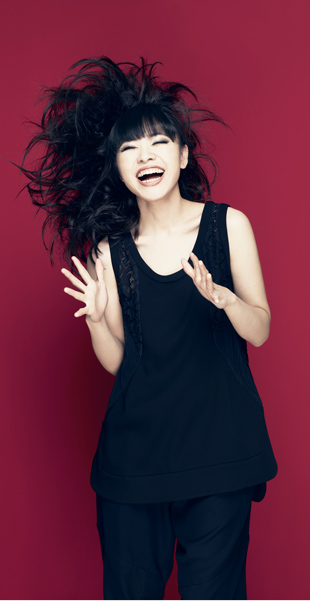Hiromi Uehara – Alive and Kicking
Thursday, October 8, 2015
Right from her student days at Boston’s Berklee College of Music, when she also recorded her debut album Brain, Hiromi Uehara always stood out from the crowd with her molten mix of classical technique, compositional daring and rock-edged-fusion, all delivered with sky-high energy levels.

The irrepressible pianist appears at the EFG London Jazz Festval on 18 November and talks to Andy Robson about how her latest album, Alive, features music that reflects a turbulent time for both her and her homeland of Japan
 She strolls careless through the hotel bar bedecked in a Zappa t-shirt. Yet weighty affairs beset Hiromi’s gamine frame. Although she claims sexism isn’t one of them. “I never found any inequalities around being a woman concert artist. Well, not true. Festival artists t-shirts are always in men’s sizes. They look like pyjamas on me. Which proves all the musicians must be men! But being a woman, like being Japanese, is natural me. I don’t try to deny it, but I don’t feature it either.”
She strolls careless through the hotel bar bedecked in a Zappa t-shirt. Yet weighty affairs beset Hiromi’s gamine frame. Although she claims sexism isn’t one of them. “I never found any inequalities around being a woman concert artist. Well, not true. Festival artists t-shirts are always in men’s sizes. They look like pyjamas on me. Which proves all the musicians must be men! But being a woman, like being Japanese, is natural me. I don’t try to deny it, but I don’t feature it either.”
But what does concern her, a pro down to her sneaker tips, is the sound for tonight’s show. “We’ve not played the Cadogan before and I’m told it’s a classical hall. And we are definitely not an acoustic piano trio! I love extreme dynamics: that ride from fortissimo to pianissimo is very important to me. We play from loud to quiet and I hope the hall allows us to do that.”
That ride across extremities is one she enjoys in conversation. She’ll talk of wishing she’d been in Zappa’s band as readily as she’ll contemplate the pain of personal loss; she’ll enthuse about Brahms’ love for Clara Schumann, as she will be serious around the disasters that have befallen her homeland. But one thing she begs: “Oh, no, please don’t write ‘Hiromi thinks about death every day’, that all the time it is tragedies!”
There’s little chance of that: it’s hard to think of someone less possessed by death than the international pianist whose every recording, every performance brims with an energy, passion and commitment that is the essence of life. Indeed, her latest album’s title, Alive, asserts her thankfulness for every moment available to her. Yet, now 34, 12 years on the road, seven years married and a string of nine albums as leader behind her, there is inevitably a richer, more complex feel to her music. Life, as revealed by this album’s story, has many rooms, and being alive must, by its very nature, include a sense of loss, of leaving, of darker corners to be explored.

Alive is Hiromi’s third release with what is now her settled trio, Simon Phillips on drums and Anthony Jackson on contra-bass. They’ve played together for four years, yet, in one of life’s little surprises, that was never the plan. “No, I had no idea. It just naturally happened. For the first album (Voice) I had Anthony and Simon in mind, but the music was largely there. The songs brought the band together. But now the band brings the songs together.”
So although Hiromi is very much the writer and leader (or ‘captain’ as she likes to call her role), there is a greater confidence between this very experienced trio. Each voice is allowed to express itself with greater freedom amid Hiromi’s complex music. And the more they are able to express themselves, the deeper, more satisfying their musical conversations become. This is evident not only in the controlled context of a studio recording, but also in the unforgiving space of a concert hall. Live, this is a trio that truly larges it. Even in the open spaces of the Cadogan Hall, London, where the band played three successive nights, they threatened to raise the roof, such was their volume. And no, there was no problem with the sound.
On other releases Hiromi’s almost manic energy, her facility to write in multiple styles from Brahms to Erroll Garner to Gilbert O’Sullivan has led critics to share the opinion of Joseph II about Mozart that there are simply too many notes. But with Phillips and Jackson, in between the clatter and rush, there’s increasingly a sense of space. Hiromi admits, “there’s a risk in silence: in the musical ride there’s a place you want to breathe sometimes. You make silence and that lets the next note shine more.”
Those shining notes can be heard in ‘Firefly’, a solo song on Alive with a folkish feel. Its simplicity contrasts to the album’s dramatic opener, the title track that kicks in like Coltrane and Tyner on steroids. But where ‘Alive’ acknowledges the big bang of new life beginning, ‘Firefly’ witnesses the brief spark that is life too quickly extinguished. ‘Firefly’ is one of the songs with a sense of personal loss for Hiromi. But understandably, she’s in no rush to share that story.
“There’s darkness in ‘Firefly’, and ‘Spirit’ (a gospel driven blues): there are certain moments when you have to say bye to people. Life ends. There are many things that I personally went through. For each song there’s a hook, a personal event that relates to me. For ‘Spirit’ I shared my story with the band. But other stories I keep to myself. But people will have their experiences of life, and find their own meaning in these songs.”
“All these tragedies that have happened in Japan should be in my music”
Of course it’s not just Hiromi who has experienced life’s ups and downs. Her homeland is still re-building after the horrors of the Tsunami and Fukushima, while growing geo-political tensions with China and North Korea bring uncertainty into the lives of many in the region. “Everything you’ve been through in life will have an impact on you. So even without thinking about Japan, it will be part of my music. I don’t know how, I don’t know why, but it should be in your music. I get asked ‘Is there a Japanese essence in your music?’ and I always answer, ‘It’s difficult to identify it’. But when I meet people, I always bow. Not because I’m interested in showing off that I’m Japanese but because it’s such a natural thing to me. In Japanese culture there can be a great sense of detail – mistakes aren’t to be made – and it can be hard to loosen up. All of that can go into how I express myself. So all these tragedies that have happened in Japan should be in my music.”
Hiromi was playing Louisiana the night of the Tsunami, in Lake Charles, an area, like New Orleans, that was struck by Hurricane Katrina. “The support from the people there for what happened in Japan was so encouraging. The first thing I thought was ‘What can I do?’ But there’s so little that you can do! All musicians thought ‘Can music help?’ I thought, ‘I don’t know, but that’s all I know what to do’. I found out that The Blue Note and a couple of Tokyo clubs were having a hard time because so many shows were cancelled. So I went back and did 18 shows and donated all the money to the earthquake benefit.”
“I don’t know how that helped financially but if I could make the audience happy, make the club happy, make the chefs happy then there was nothing negative about it. I still think about what happened. Before, the connection with the clubs was about work. I come, I play. But since the tragedies we became like family and whenever I’m in Tokyo I go and say ‘Hello’. It brought us together. There are so many parts in Japan that are still in the process of recovering: so I’m going back to play more shows in that part of Japan.”
But a return to Japan means confronting one of her biggest fears: flying. “I hate planes! Every plane ride I think about dying. Whenever there’s turbulence, ooohhh!” Yet with that fear comes opportunity. It provides the motivation for Hiromi to deliver the best show she can. “If I do have an unfortunate death, I want to die knowing my last show was the best I could do!” So Hiromi works hard at looking after herself: yoga and stretches are in the daily routine as are getting plenty of sleep and eating well.
“I have to be in the best condition for my audiences. I have to thank them that they have chosen to give two hours of their life to me. I feel like the captain of the boat and I invited them along for a ride on the boat so I have a great responsibility to provide the best possible ride on the boat!” And as musical rides go few are more exhilarating than those provided by Captain Hiromi. Alive? There was never a moment’s doubt.
Discover...
Feature EST – Three Falling Three
Feature Robert Glasper – Breaking Cover
Feature Joshua Redman and The Bad Plus – Bad to the Bone
This article originally appeared in the June 2014 issue of Jazzwise. Subscribe to Jazzwise
Photos: 1 and 2 by Muga Miyahara, 3 by Tim Dickeson